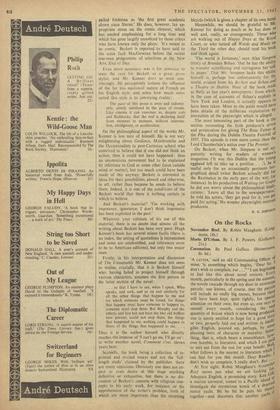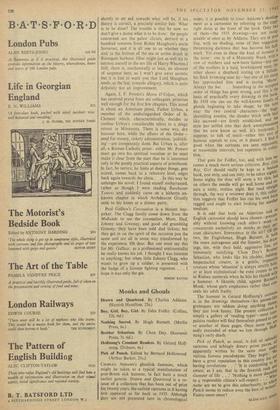On the Rocks 'A LETTER,' said an old Commanding Officer
(1. mine, 'is something which begins, "Dear Sir. 1- don't wish to complain, but ..."' I am beginning to feel like this about novel reviews. Every month, particularly in the spring and the autumn' the novels cascade through my door in enormous parcels; one knows, of course, that the parcels will include no really big names, because the1 will have been kept, quite rightly, for speela attention on their own; but even so, one says to oneself every month, considering the vas,t quantity of fiction which is now being produee°' one is surely entitled to hope for a good 011 or two, properly laid out and written in inten_ gible English, pointed up, perhaps, by some pleasing twist of character or morality. S°111,e, thing, that is, which bears a resemblance, ho".,' ever humble, to literature, and which I an) 10;d 1 to sort out from the rest for your benefit. VVe'i what follows is the nearest to literature which can find for you this month. Dear Reader, don't wish to complain, I really don't. But • ; At first sight, Robin Maugham's Novenlyer Reef seems just what we are looking fn Adequate English, a promising story. Ken G."
' ,
a marine surveyor, comes to a Pacific island _d investigate the mysterious wreck of a desert'ry motor yacht. Bit by bit he puts his the° together—and discovers that another Yacht
shortly to set sail towards what will be, if his theory is correct, a precisely similar fate. What is to be done? The trouble is that by now we don't give a damn what is to be done: the people concerned are the palest clichés, derived at a hundred removes from Robin Maugham's uncle Somerset, and it is all one to us whether they sink to the bottom of the sea or arrive drunk in Ramsgate harbour. (One might just as well try to interest oneself in the sex life of Harry Wharton.) Still, there is, mechanically at least, an element of suspense here, so I won't give away secrets; but it is fair to warn you that Lord Maugham tends, at the last, towards allegory, which is quite definitely not an improvement.
Again, J. F. Powers's Morte D' Urban, which has received praise from my colleagues, promises well enough for the first few chapters. This novel is about an American priest, Father Urban, a member of the undistinguished Order of St. Clement which, characteristically, decides to confine Urban's considerable talent to a dingy retreat in Minnesota. There is some wry, dry humour here, while the affairs of the Order— need for money, rickety administration, 'politick- ing'—are competently done. But Urban is, after all, a Roman Catholic priest: either Mr. Powers must go into his spiritual vocation or he must make it clear from the start that he is interested only in the purely practical aspects of priesthood. In fact, he teeters; he hints at deeper things, gets scared, comes back to a refectory level, edges back again towards the abyss.... In this way he unhinges his novel. I found myself embarrassed, rather as though I were reading Barchester Towers and suddenly came on a hitherto un- known chapter in which Archdeacon Grantly sank to his knees at a dinner party.
Paul Gallico's Coronation is a blatant tear- jerker. The Clagg family come down from the Midlands to see the coronation, Mum, Dad, Johnny and Gwenny, and good old grumbling Granny; they have been sold dud tickets; but they get in on the spirit of the occasion just the same and are all in some way transformed by the experience. Oh dear. But one must say this for Mr. Gallica: as a professional sentimentalist he really knows his job. I thought I was immune to anything; but when little Johnny Clagg, who wants to grow up a soldier, is presented with the badge of a famous fighting regiment. . . . hope it was only the gin.
SIMON RAVEN











































































 Previous page
Previous page